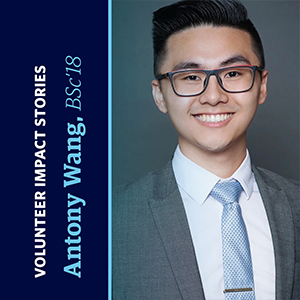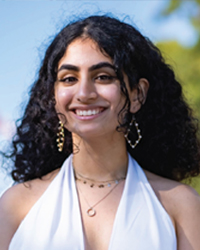Antony Wang: Devotion has its pay-offs

When Antony Wang (BSc’18) hears how students are inspired by his advice or feedback, he gets “butterflies” in his stomach. In fact, he says he’s their number one cheerleader as he watches them progress from struggling to get their application looked at, to getting an interview, and then to finally going through the interview process.
“To see them actually land a job, I think that’s the most exciting moment,” he tells us via Zoom.
His current dedication to helping others is merely a continuation of his extensive history of volunteer work from his days as an integrated science major (in biomedical sciences and environmental sciences, with a minor in commerce). As an undergrad, the Vancouver-born and -bred Wang volunteered for everything from UBC Orientations to UNICEF UBC and the UBC Heart and Stroke Foundation Club. Plus, he held several positions at the UBC Science Undergraduate Society, eventually becoming president.
“I truly loved my time as a UBC science student,” he says. “I loved the culture, professors, students, faculty — everyone was just so supportive and helpful.”
That’s why, after graduation, he never stopped volunteering.
In 2018, he helped evaluate student applications to UBC as a volunteer broad-based admissions alumni reader. Although he found it challenging to pick the best candidates, he also found it “very rewarding” and was amazed “to see what students these days are up to.”
Since 2020, he has volunteered each year to speak at UBC Science and SCI Team’s Alumni Networking Nights (then called Beyond the BSc). He felt it was important to share lessons from mistakes he made and to offer advice on “how to prepare for ‘the real world.’”

Ritisha Jhamb, a second-year science student who helped to organize the 2023 Alumni Networking Night, says she noticed how Wang “offered valuable guidance and encouragement to students struggling to find their path in science, demonstrating his knowledge and expertise in the field.” She also spoke with another alum who “shared valuable insights about how to maximize one’s university experience,” which Jhamb found particularly relevant as both studied cognitive systems.
Overall, Jhamb says she felt a “strong connection” to alumni who shared their struggles in determining their career paths.
“Many students, including myself, often feel lost and uncertain about how to maximize our university education,” she explains, “but hearing that the key is to focus on taking small steps towards our interests and seeing where each experience leads us, rather than obsessing over the big picture, was both helpful and reassuring.”
Yet it’s not just the students who learn from the experience — Wang says it’s a “two-way street.” He feels he learns from students about how fast things are changing and seeing their “level of maturity, the breadth of experience…[and] all these different technologies that they’re used to or have seen or experienced.”
In addition, he notes that as an assistant branch manager for RBC, he’s always on the lookout for potential candidates to suggest to his employer through their referral program. Although he works at a bank, he points out they have other numerous departments — law, technology, operations — to consider.
That’s why he encourages everyone to always appreciate connections and the value of volunteering.
“Never belittle your volunteer experience,” he says. As he points out, whether you’re a student or an alum, you never know who might, some day, be able to offer a helping hand.

